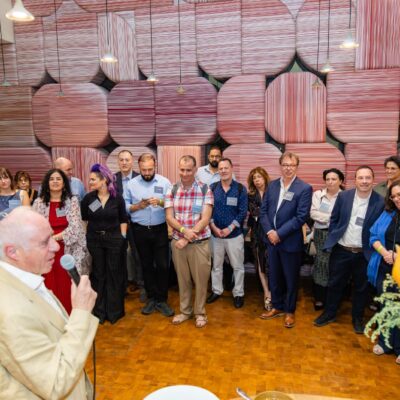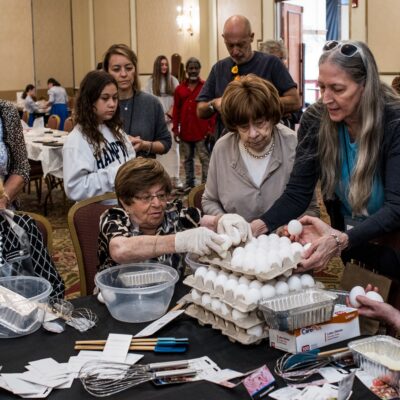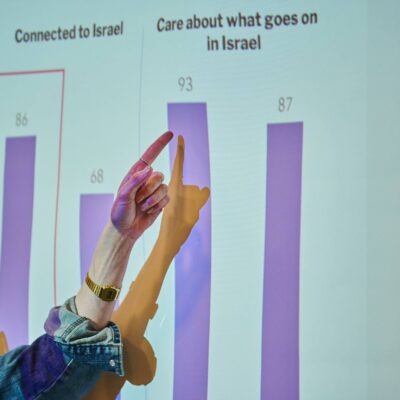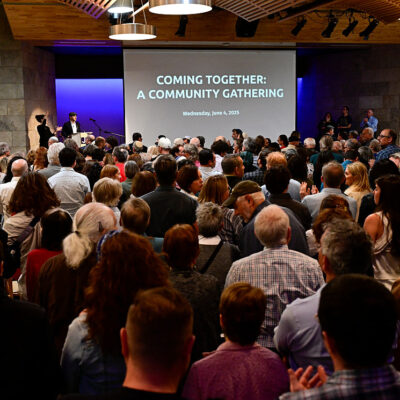Opinion
V'CHAI BAHEM
Some people need to eat on Yom Kippur. It’s time to stop laughing about it.
Last week, I came upon a New York Times article titled “Our Best Rosh Hashanah and Yom Kippur Recipes.” It was shared on Facebook to a chorus of laugh emojis and jokes.
I can certainly understand how this headline might feel jarring or comical. After all, Yom Kippur is no ordinary holiday on the Jewish calendar. On this day, those safely able to fast for 25 hours are traditionally required to do so. But as the founding director of A Mitzvah to Eat, which empowers Jews needing ritual accommodations to safely connect to sacred Jewish practice and community, I am especially attuned to the message that may be sent by laughing at the idea of using recipes designed for Yom Kippur. It is important to raise awareness of the potential for danger in acting like there is anything funny or inappropriate about eating on Yom Kippur.

Francesco Carto fotografo/Getty Images
According to traditional Jewish sources, those unable to safely fast actually have a mitzvah to eat on Yom Kippur. Nevertheless, as someone unable to safely fast myself, I know how it can feel wrong to eat on Yom Kippur, even when eating protects life, maintains safety or prevents significant or ongoing health impacts. For some people unable to safely fast, the lack of communal support along with messaging that Yom Kippur is an obligatory fast for everyone can make it very difficult or even impossible to eat safely on Yom Kippur. Now, add in being the subject of jokes. Imagine what it is like to have to eat on Yom Kippur while others are laughing at the mere concept.
Perhaps you feel that a laugh emoji on Facebook is not really a problem. As I read through the comments of that post, one particular interchange stood out. One person commented that because some people need to eat on Yom Kippur, this topic should not be the subject of a joke. While I cannot quote the response, the gist was basically this: “Surely the people who need to eat on Yom Kippur aren’t on social media. Surely they won’t be reading this Facebook post.”
Nothing could be farther from the truth. Jews unable to safely fast use social media just like those who are safely able to fast. We use social media just like you do — to find community, for fun, for support and to access resources that we might not otherwise have known about.
While social media offers content on a variety of topics, A Mitzvah to Eat’s social media stands out as a place where Jews unable to safely fast or who need other ritual accommodations can find resources, support and advocacy that meet their needs. In fact, in 2023, A Mitzvah to Eat’s prayer guide for those needing to eat on Yom Kippur reached 85,000 people on Facebook alone.
We were hoping that our work would reach an even wider audience this year — but last week we encountered a significant challenge. Due to one external link, our Facebook page was flagged as not following Community Standards and was unpublished.
In past years, synagogues, organizations and individuals from across the world shared our content supporting those with a mitzvah to eat on Yom Kippur. But this year we are worried that those needing access to our message and materials will not be able to find them.
You can help. Please share our content, whether it’s our website, our new Facebook page (A Mitzvah to Eat – AMTE), Facebook group, Instagram account or all of them. Share in your networks and via WhatsApp. Share with your local communities and your social media networks. You can introduce our work and encourage safe observance of Yom Kippur with the following language: “When fasting is safe, it is a mitzvah to fast. When fasting is unsafe, it is a mitzvah to eat.”
There are multiple ways to support Jews unable to safely fast. A first step is being aware of the messaging that we are using in our synagogues, communities, and yes — on social media.
Some people need to eat on Yom Kippur. It’s time to offer support, meaning and Jewish belonging. And it’s time to stop laughing about it.
Sarah Osborne is the founding executive director of A Mitzvah to Eat.

 Add EJP on Google
Add EJP on Google









